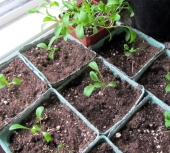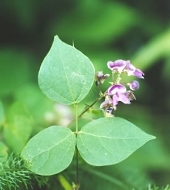An interesting little plant that I've been considering growing for a while is this handsome fellow, the thicket bean. A wild cousin of the much more well-known lima bean, thicket beans make seeds that are slightly bigger than a lentil and are known to have relatively low yields. On top of that, the beans are extremely attractive to weevils, to the point that in places with high weevil populations it can be difficult to get any harvest from them. Why would anyone grow them, you may ask?
Despite these drawbacks, thicket beans have a lot of interesting characteristics going for them! They're among the most frost-hardy of the Phaseolus beans, growing natively all over the eastern US and some parts of southern Canada as herbaceous perennials; they're extremely disease resistant, particularly against white mold; and (in my estimation) they have a lot of potential to be bred for yield and bean size. Certain populations of wild beans show evidence of being selected for non-shattering pods, so apparently someone at some point agreed with me! They can also allegedly be hybridized with lima beans, which makes the goal of breeding a productive and hardy perennial Phaseolus even more feasible.
I've recently gotten a packet of seeds from Experimental Farm Network, and am planning on evaluating them to see which ones have the most desirable traits. Is anyone else currently growing them, or has grown them in the past? I'd love to hear about your experiences with them!











